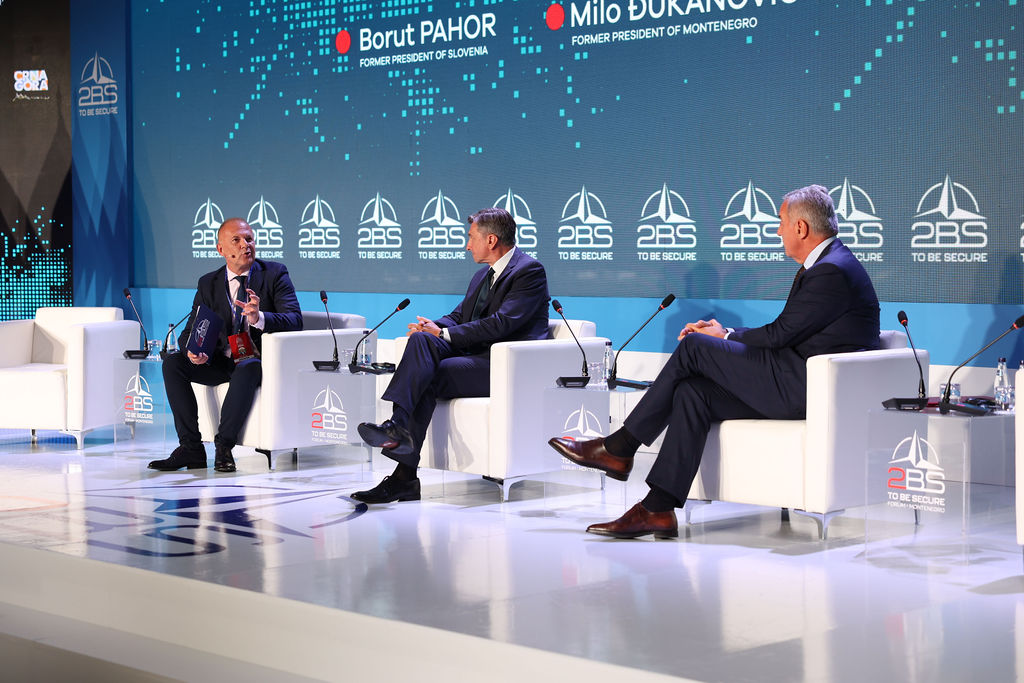Montenegro is in a great position and could be the next country in line for expansion, according to former Slovenian President Boris Pahor. On the other hand, former Montenegrin President Milo Đukanović does not share Pahor’s opinion, believing that Montenegro lacks serious state political management to fulfill the domestic tasks assigned by Europe.
The two former presidents agreed during the panel discussion “Looking Back, Looking Ahead – Future of the Region” at the 2BS Forum that Europe has opened its doors to the Balkans and that this opportunity needs to be seized as soon as possible.
“There is an opinion that Montenegro could be the first Balkan country next in line for enlargement. If such a vision and philosophy exist, Montenegro needs to seize it. Montenegro must do everything possible to reach such a decision for enlargement,” said Pahor.
He stated that after the aggression against Ukraine, the attitude towards enlargement, which had previously prevailed in Brussels, changed.
“Don’t underestimate this change in mentality regarding enlargement in Brussels. That change is real; there is now a political will to move forward with enlargement in the Balkans. From a geopolitical perspective, absolutely, but it should be noted that Brussels is looking for real reforms and that it’s not just about geopolitics for the sake of stability. We truly see an opportunity for enlargement in all Balkan countries now,” Pahor assessed.
Pahor believes there is no reason for conflict in the Western Balkans, but if someone outside has an interest in causing such conflict, it would be Russia.
Former president Đukanović believes that Montenegro has confirmed its internal capacity to realize reforms and join the EU through overall development. However, he states that we cannot ignore the regression over the past four years.
“This has led to serious ruin of the fragile achievements we made over 14 years, in all areas – security, political, education, and healthcare. Montenegro has lost the key prerequisite that qualified it as a leading country in this region, which is exemplary political stability. This is evidenced by the fact that we have changed three governments so far, from clerical-nationalist to Greater-Serbian and populist. This indicates that Montenegro will not be able to seize the opportunity that is now emerging,” Đukanović assessed.
He said that now we again have the doors open for enlargement.
“If the doors remain open, there is no doubt that Montenegro is ahead of the other candidates. Our homework can be done by no one but us. Montenegro has potential, but it requires serious state-political management that Montenegro currently lacks,” Đukanović assessed.
When asked whether Serbia now has the potential to be on the European side, Đukanović said, “There is no doubt that Serbia has the internal potential to be on the Euro-Atlantic side,” but he noted that the problematic state policy is marked by the ideology of Greater-Serbian nationalism.
“This threatens peace and stability in the region. Serbia is balancing between the East and the West, and such a policy has been one of short-term success, as Vučić has managed to maintain himself on that thin line. However, I don’t believe this is a good policy because once the duration of that policy ends, the state is left in the same position it was in before it started,” assessed the former Montenegrin president.
The interest of the region, according to Đukanović, is stability. However, he argues that the Greater-Serbian policy, which has been tolerated by the international community, has threatened the sovereignty of neighboring countries.
“If you have allowed Greater-Serbian nationalism to resurface through ineffective Western policies, alongside a clear destructive agenda from Moscow, enabling Serbia to use the Milošević mantra of ‘Serbs are threatened, and Serbia needs to protect them,’ then such a policy endangers the sovereignty of neighboring countries, stability, and hinders development. This is the impact of international politics in this region over the past period,” Đukanović emphasized.
To the question from Adnan Rondić about whether he sang “No one can do anything to us, we are stronger than Serbia” during the celebration of DPS’s success in the local elections, Đukanović says he does not know and adds:
“My question is, what if I did? If I sang ‘we are stronger than Serbia, America, Russia,’ is that hatred?” asked Đukanović.
Speaking about the election results in Podgorica, he said they are indicative because they showed that the ruling majority at the state level does not have a majority. He also noted, as he said, the steep decline of new parties that call themselves pro-European.
